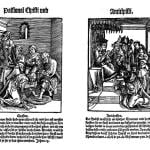Habakkuk 3:16-19 Faith Praying
We come to to the end of the year. A year that has seen many changes. Many people we treasure have left us. Many changes that surrounded us have changed us forever. Habakkuk was in the midst of similar changes. His people were dying. A foreign invasion was about to take complete control. Habakkuk’s life as he knew it, would be changed forever. He need to look to God for answers. He found those answers, found faith, and found the ability to go forward. All because of God.
It takes living by faith. The famous verse in Habakkuk, which is the central verse used throughout the New Testament is this:
“Look, his ego is inflated; he is without integrity. But the righteous one will live by his faith.” (Habakkuk 2:4, HCSB)
Three different writers of the New Testament realized that this quality was central to the life of a Christian. Each focus on a different part of the life.
Romans – The JUST shall live by faith.
James — The just SHALL LIVE by faith.
Hebrews – The just shall live by FAITH.
However, specifically, Habakkuk was living by faith in his prayer life. For a person to live by faith, they need to have a prayer life. Our prayer life will indicate just how much we are living by faith. To live by faith is to trust God to lead us, and my prayer life will be an indication about how much I am letting God lead me. So I want to talk to you today about what I would call “Faith Praying.” A Christian can thank God and praise God. However, many times, we are asking God. So when we ask God, as a people of faith, our prayers need to be faith prayers. We want answers to our prayers. But as God’s people who live by faith, we need faith prayers which can receive one of three answers.
In general, a Christian will get three answers to their prayers:
YES, NO, and NOT YET
To live by faith in my prayer life I need THREE things:
God’s rest when He tells me NO.
God’s joy when He tells me YES.
God’s strength when He tells me NOT YET.
When God says NO to my prayers, I need to live by faith in His rest.
“I heard, and I trembled within; my lips quivered at the sound. Rottenness entered my bones; I trembled where I stood. Now I must quietly wait for the day of distress to come against the people invading us.” (Habakkuk 3:16, HCSB)
Habakkuk was praying for a yes of deliverance. However, God showed him through the course of these prayers that God was not going to deliver His people out of trouble during this time. Essentially, Habakkuk knew after praying that God was going to give a NO to his prayers. He was trying to warn the people about the coming difficulties.
Habakkuk saw trouble in his time. You and I also have trouble in our time. You may seem fearful, frustrated, confused, unfulfilled. You may gave these feelings because you are worn out. The holidays are here and you may feel sad or stressed out. You may be worn out by the holiday rush and with busy kids.
In the midst of all of this stress, you ask God for something and you want a YES. But God tells you NO. It is at times when God says NO that you need to learn to rest in His provision. As children, we always to want to hear the answer to our calls to be YES. Many times however, we get told NO. We don’t like it. Being told NO means that whatever it was we wanted, it was not meant for us. Sometimes, we have to accept NO from God in our prayer life. Even when we want the YES, we have to accept NO. When I get a NO from God, it does not mean that I received a bad answer. God’s NO’s are never bad for me. God still provides for me even when He says NO to what I want or what I am asking for. I have to overcome the selfish impulse to realize that God knows what He means when He tells me NO. When God says NO, God provides a rest. Jesus said for everyone to come to Him and He would give them rest.
““Come to Me, all of you who are weary and burdened, and I will give you rest.” (Matthew 11:28, HCSB)
“Let us then make every effort to enter that rest, so that no one will fall into the same pattern of disobedience.” (Hebrews 4:11, HCSB)
In Hebrews, there is the contrast between two groups of people. The first group were people who lived by faith and who were obedient but were told no by God and did not yet enter the rest God was going to give them. The second group of people were those who did not live by faith but who were disobedient. These disobedient people never saw God’s rest. They saw that God said NO and so they went off and disobeyed Him. They sinned against God. Instead of getting the rest, they received judgment. When God says NO to your prayers, you don’t want to leave God and try to “make it happen” your own way. Your situation will get worse if you do. Instead, you need to have faith to know that God knows what He is doing and just rest in the fact that God will take care of it.
When God says NOT YET to my prayers, I need to live by faith in His joy.
“Though the fig tree does not bud and there is no fruit on the vines, though the olive crop fails and the fields produce no food, though there are no sheep in the pen and no cattle in the stalls, yet I will triumph in Yahweh; I will rejoice in the God of my salvation!” (Habakkuk 3:17–18, HCSB)
Jesus tells a parable about the fig tree and in this case, he talks about the man who owned the fig tree and how it was NOT YET fruitful.
“And He told this parable: “A man had a fig tree that was planted in his vineyard. He came looking for fruit on it and found none. He told the vineyard worker, ‘Listen, for three years I have come looking for fruit on this fig tree and haven’t found any. Cut it down! Why should it even waste the soil?’ “But he replied to him, ‘Sir, leave it this year also, until I dig around it and fertilize it. Perhaps it will bear fruit next year, but if not, you can cut it down.’ ”” (Luke 13:6–9, HCSB)
The point of that parable is that what we pray for will bear fruit. It just takes time. So sometimes, my prayers are like that fig tree. We have this desire and we don’t know if God will ever give us an answer. Sometimes, we need to fertilize our NOT YET prayers with joy. God has not yet answered my prayers, but NOT YET does not mean NO.
When Heike was praying for a kidney. We kept praying for a YES. Many times, God was telling us NOT YET. But we had to take joy in the fact that a NOT YET is not a NO. We prayer for a YES, until God clearly tells us a NO. Until we get that YES, the answer to the prayers are NOT YET. So if you are praying for your circumstances, it may feel like a NOT YET. Then keep fertilizing the soil. So f you are praying for your family, and it feels like a NOT YET, then keep fertilizing the soil.
When God says YES to my prayers, I need to live by faith in His strength.
“Yahweh my Lord is my strength; He makes my feet like those of a deer and enables me to walk on mountain heights! For the choir director: on stringed instruments.” (Habakkuk 3:19, HCSB)
Many times God changes me when I pray. I start praying a selfish prayer. I want something to happen my way. God is there saying NO to my prayers. As I keep praying about it, God starts lining me up with what He wants in my life. He starts to change my perspective. I go from a NO to a NOT YET, because God has shown more about me, the prayer I am praying and even what happens if that prayer gets answered. So I start to change my prayers. I tweak them to line with God’s agenda.
“But seek first the kingdom of God and His righteousness, and all these things will be provided for you.” (Matthew 6:33, HCSB)
I start seeking God’s will in the matter, not just my will. I start thinking about God and how He wants me to be involved. This is what happened to Jesus, to Habakkuk and it should happen to every Christian who grows in prayer as they live by faith.
Jesus prayed in the Garden. He wanted a way out of the cross. He asked three times for a YES to take it away. God didn’t answer that prayer so Jesus knew that His prayer would not be answered. So He changed His prayer: “Not my will, but Your will.” When He changed His prayer by lining up with God and His desire for His Son, the answer to Jesus’ prayer changed from a NO to a YES.
Habakkuk is praying to God and asking for an answer. But you can see from this passage that Habakkuk goes from fear to faith.
“I heard, and I trembled within; my lips quivered at the sound. Rottenness entered my bones; I trembled where I stood. Now I must quietly wait for the day of distress to come against the people invading us.” (Habakkuk 3:16, HCSB)
He’s scared when he prays. And Habakkuk knows that God is going to give him a NO to his prayer. That is why Habakkuk has to rest in what God is going to do. But later in the verses, Habakkuk says something new about God.
“Yahweh my Lord is my strength; He makes my feet like those of a deer and enables me to walk on mountain heights! For the choir director: on stringed instruments.” (Habakkuk 3:19, HCSB)
When it says in verse 1, “A prayer of Habakkuk the prophet, according to Shigionoth,” it means that the prayer is to be used to musical accompaniment with a spirit of excitement and triumph. This is confirmed by two things: 1) the very last phrase of the book, “To the choirmaster: with stringed instruments,” and 2) the use of “Selah” at the end of verses 3, 9, and 13.
Notice that when stops praying a selfish prayer, but starts to pray by faith, God changes his changes his heart. Earlier, he is scared and having to find rest in God when it looks like God is saying NO. Now, Habakkuk knows that God “will enable him” to get through it. God will be strong enough to give Habakkuk a YES, if Habakkuk would live by faith in God.
This process of prayer is the same for us. Sometimes, I am going to get a NO to my prayers and I need to rest in what God is doing right now. Sometimes, I am going to get a NOT YET to my prayers and I need to take joy that God is up to something. The triumph is coming, but we have to wait for it. Sometimes, I am going to get a YES, but it means the YES comes not from my efforts, but from God’s strength.
Two prophets who struggled with God’s will were Jonah and Habakkuk…
• Jonah ran from God when he heard what God would do. Habakkuk ran to God, wondering what God would do.
• Jonah saw the salvation of God to the Gentiles. Habakkuk saw the sovereignty of God through the Gentiles.
• Jonah’s story ends in foolishness as he worries about a gourd. Habakkuk’s story ends in faith as he trusts in God.
The difference between Habakkuk and Jonah—between you and the person who’s despairing—is simply this: Jonah had to learn in the fish. Habakkuk learned in the high tower. You and I have a choice. God is going to teach us because the just shall live by faith. Where do you want to live? Where do you want to learn your lessons about faith?
I have a choice. I can either seek the Lord with determination and expectation in the tower—or I can get tossed around in the storm in the belly of the great whale and wonder, “Why is my life always going through storms? Why is there always seaweed around my head? Why do I always feel cramped? Why am I always in the dark?”
The reason people are always in the storm is because they’re never in the high tower. The message here is simple: Habakkuk’s problems were greater than Jonah’s, his message much more difficult—but he ends in victory because he learned the secret of seeking God.
The Lord wants us to seek His face, to hear His voice, to see His vision that no matter what is happening around us, we might be oases of tranquility and peace that passes understanding. No matter how bad the news might be, He wants us to rejoice in Him. He is our strength and our joy.
1 J. Ronald Blue, “Habakkuk,” in The Bible Knowledge Commentary: An Exposition of the Scriptures, ed. J. F. Walvoord and R. B. Zuck, vol. 1 (Wheaton, IL: Victor Books, 1985), 1521.
2 James E. Smith, The Minor Prophets, Old Testament Survey Series (Joplin, MO: College Press, 1994), Hab 3:19b.
3 John Piper, Sermons from John Piper (1980–1989) (Minneapolis, MN: Desiring God, 2007).
4 Jon Courson, Jon Courson’s Application Commentary: Volume Two: Psalms-Malachi (Nashville, TN: Thomas Nelson, 2006), 869.
#theheartofgod, #minorprophets
















